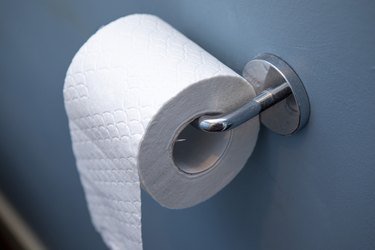
Forget the wrinkle-smoothing creams and anti-aging serums. The secret to growing old gracefully comes straight from your sink. Yep, water helps keep every system in your body working smoothly.
So, when you don't get enough of it, you'll eventually run into problems, especially as you age. Indeed, dehydration is a common cause of hospitalization in older adults, according to the Cleveland Clinic.
Video of the Day
Video of the Day
What's more, good hydration is linked to healthy aging. According to a large January 2023 National Institutes of Health study in eBioMedicine, adults who stay well-hydrated tend to live longer than those who don't. They also appear to be healthier and are at a lower risk for chronic conditions like heart and lung disease.
That's why getting in a glass of water first thing is a great way to start each day.
Here, Christine E. Kistler, MD, associate professor in the division of geriatric medicine and department of family medicine at the UNC School of Medicine, explains why older adults are more vulnerable to dehydration and how drinking water in the morning can support healthy aging.
Warning
Every older person’s health situation is unique, which means that their water needs will vary. Some older adults must restrict fluids due to certain medical conditions (for example, heart failure). WIth that in mind, always consult with your doctor about how much water intake is safe for you, Dr. Kistler says.
6 Benefits of Drinking Water in the Morning
1. It Reduces Nighttime Bathroom Trips
Getting your water earlier in the day is a smart strategy to stay hydrated while preventing (or reducing) late-night potty trips.
"At night, people are more likely to worry about getting up to use the bathroom, so they fluid-restrict to avoid bathroom trips," Dr. Kistler says.
But, as we know, this can lead to dehydration. A tall glass of H2O in the a.m. will replenish your body's fluids, and by timing it many hours before bedtime, it won't give you the urge to pee mid-slumber.
What's more, using the bathroom at night may also be more dangerous for older people because there's a higher risk of falling in the dark, Dr. Kistler adds.
So, tanking up in the morning not only reduces your risk for dehydration but also helps prevent potential nighttime falls. Win-win.
2. It Helps Your Body Maintain a Normal Temperature
Older adults are often hit harder by environmental disturbances like heatwaves, Dr. Kistler says. When your body overheats, it can take a toll on the heart and kidneys, she explains.
Making sure you're staying hydrated during the hot months helps keep stress off your organs and, essentially, prolongs life, Dr. Kistler says.
3. It Helps Eliminate Toxins from Your Body
If you don't stay hydrated, toxins like urea can build up in the body, Dr. Kistler says.
When urea accumulates, some of your body functions may falter, and your electrolyte balance may become abnormal, Dr. Kistler says. And this creates a damaging domino effect because electrolyte disturbances can result in delirium (a condition characterized by severe confusion), she explains.
This type of chain reaction can occur, for example, with urinary tract infections, which may happen when you're not drinking enough fluids and flushing the bladder effectively, Dr. Kistler says.
Thus, drinking a glass of water in the morning can help flush your bladder, rid your body of toxins and keep your system equilibrated.
4. It Protects Heart Health
When your body isn't getting what it needs (such as water) to operate optimally, all your systems must work harder, including your heart. So, it stands to reason that staying hydrated can have a protective effect on your ticker.
And that's exactly what one recent study, presented at the European Society of Cardiology Congress 2021, demonstrates. Researchers concluded that good hydration may help prevent (or delay) changes in the heart that contribute to heart failure.
5. It Supports Memory Function
"Again, the more you tax your body, the more your heart, kidneys and liver have to work, and the harder it is on your brain," Dr. Kistler says.
Remember, if you're not drinking sufficient water and flushing out things like urea, this can lead to cognitive issues like confusion and disorientation, Dr. Kistler says.
That's why sipping water in the morning and staying hydrated are essential to support long- and short-term memory function.
6. It Promotes Weight Management
Substituting water for sugar-sweetened beverages like juices or sodas — which contain empty calories and few nutritional benefits — is a great approach to help maintain a healthy weight, Dr. Kistler says.
Not only will you slash calories from your diet, but you'll also avoid (or reduce the odds) of experiencing the negative health effects associated with these sugary drinks.
For example, sodas can cause electrolyte disturbances and increase your risk of diabetes and hypertension (read: chronic diseases that can shorten your lifespan), Dr. Kistler says.
Plus, staying hydrated will help you feel more satiated. In other words, you'll feel less hungry (and will likely eat less) when you guzzle a glass of water in the a.m.
Related Reading
Why Aging Ups Your Risk of Dehydration
"The reason that older adults are often dehydrated is complex," Dr. Kistler says.
Many variables come into play. Here are some of the most common factors that hinder proper hydration in older people:
1. Less Sensitivity to the Sensation of Thirst
Aging adults may not feel as thirsty. Here's why:
With age, our cells — including those in our brain — become less robust, Dr. Kistler says. As a result, the osmostat (the part of our brain which helps regulate thirst sensation) may not be as effective in identifying thirst as it was when we were younger, she explains.
Related Reading
2. Your Adrenal Glands Don’t Work as Well
Similarly, your adrenal glands may not function as vigorously as they did in your youth.
Here's why that matters for dehydration: The adrenal glands, which sit on your kidneys, send out hormones to your body to retain (or get rid of) fluid, Dr. Kistler says. So, if they're not working properly, you may not hold onto the hydration (in the form of fluid) that your body needs.
3. Less Mobility to Get to the Restroom
Mobility issues can play a pivotal role in dehydration. That's because people with conditions (such as arthritis) may choose to restrict their fluids if they find it difficult or painful to walk to the bathroom every hour or two, Dr. Kistler says.
4. A Tendency to Drink Less Fluid to Decrease Incontinence
Incontinence (i.e., loss of bladder control) is a common issue that comes up as we get older, Dr. Kistler says. And some adults make a conscious effort to drink less water hoping to leak less urine, she says.
5. Taking Certain Medications
Many older adults take medications that cause them to be at a greater risk for dehydration, Dr. Kistler says. For instance, diuretics (which people often take to help manage heart failure) can increase urination and consequently dehydration, she says.
Another example: laxatives. Some elderly folks lean on laxatives because their bowels are more sluggish, but this may speed up transit time in the gut and reduce water absorption, Dr. Kistler explains.
- European Society of Cardiology: “Drinking sufficient water could prevent heart failure”
- Cleveland Clinic: “Drink Up: Dehydration is an Often Overlooked Health Risk for Seniors”
- eBioMedicine: "Middle-age high normal serum sodium as a risk factor for accelerated biological aging, chronic diseases, and premature mortality"
Is this an emergency? If you are experiencing serious medical symptoms, please see the National Library of Medicine’s list of signs you need emergency medical attention or call 911.


